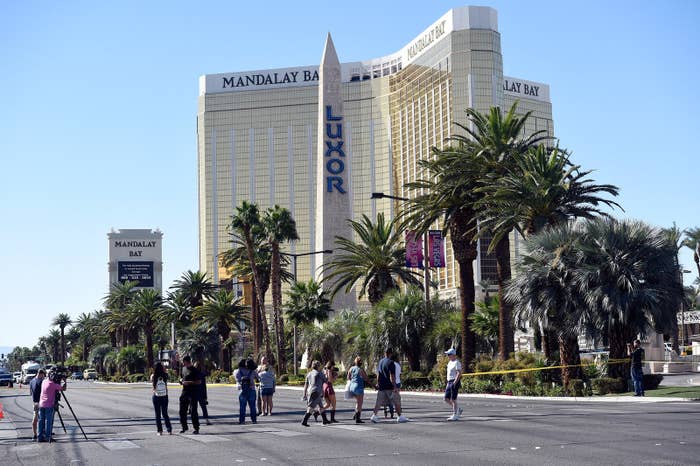
ISIS’s claim of responsibility for the Las Vegas shooting was driven less by a desire to strike fear into the US than wanting to show its supporters that it remains relevant, experts say, dismissing the the militant group’s claim that it had influenced the shooter in the months beforehand.
US officials, including the FBI and Las Vegas sheriff's department, have said they have no evidence to tie the shooting, which was carried out by 64-year-old Stephen Paddock and left more than 50 people dead, to ISIS. "We have determined to this point no connection with an international terrorist group," FBI investigator Aaron Rouse told reporters Monday.
But the group has doubled down on its claim — releasing a statement and video, even going so far as to provide an alleged nom de guerre used by Paddock.
If no evidence emerges to show that Paddock really was an ISIS agent, there’s no shortage of reasons for ISIS to lay claim to the attack. ISIS currently has a "faltering brand," said Herbie Tinsley, a researcher with the University of Maryland's National Consortium for the Study of Terrorism and Responses to Terrorism (START), and that could have spurred them to jump on the news from Las Vegas.
ISIS is having to adjust to being put on the defensive over the last year, with its territory in Iraq and Syria shrinking dramatically in the face of a US-led campaign. The collapse of its self-declared caliphate, with its capital in Raqqa, has prompted a shift in its propaganda strategy away from promoting the idealized version of life under their rule that ISIS has highlighted to an emphasis on external attacks, analysts said.
"To some degree you need to be able to attempt at least to show that you are still effective and the effectiveness they have seen in terms of attacks on the US have been somewhat limited," Tinsley said in a phone interview.
The announcement also may not have been targeted at Americans, Tinsley said. "Jihadists do not primarily message to Westerners. They're more often and more specifically for those who are already in their camp or sympathetic," he said.
And it's unlikely that the message’s intended targets will be more likely to doubt ISIS moving forward. "There's no chance this statement will be retracted," Charlie Winter, a senior research fellow with the International Centre for the Study of Radicalisation in London, told BuzzFeed News. "It's not exactly a sustainable way of operating; you can only do something like this once in a while because credibility does matter. But the Amaq News Agency's credibility and ISIS's credibility is not as fragile as we think it is."
So far this year, the group has already claimed credit for several incidents where they turned out to be uninvolved. A security alert at Paris' Charles de Gaulle airport that the group said was their doing turned out to be an irate passenger. After President Donald Trump labeled a shooting at a casino in the Philippines an "act of terror," ISIS quickly pounced, issuing a statement taking full responsibility. The man behind the Manila shooting later proved to be a disgruntled gambler, heavily indebted to the house.
Trump had not commented on ISIS's claim by Monday evening, and the White House was not asked about it during the daily briefing, though some of the president’s political allies, including former Alaskan governor Sarah Palin, credulously tweeted about the announcement:
This is huge. https://t.co/tOj3ytYedM
Palin's tweet wound up a relatively isolated event as cable news and journalists on Twitter for the most part discarded ISIS's claim, though it was picked up by the Associated Press and others.
But even the rampant skepticism among the Western media may play into ISIS's hands. Winter told BuzzFeed News that over the last few years in particular, the group has worked hard to cultivate a conspiratorial view toward the media.
"Jihadis and would-be jihadis will already have a pretty entrenched sense that the mainstream media is essentially not telling the truth about what happens in various parts of the world," Winter said. "So even if it becomes very clear — even if it emerges that there's unambiguous evidence that this guy had nothing to do with ISIS, that he wasn't even Muslim, that he was operating as an individual attacker ... that wouldn't actually matter to true believers in the ISIS cause. It wouldn't matter."
